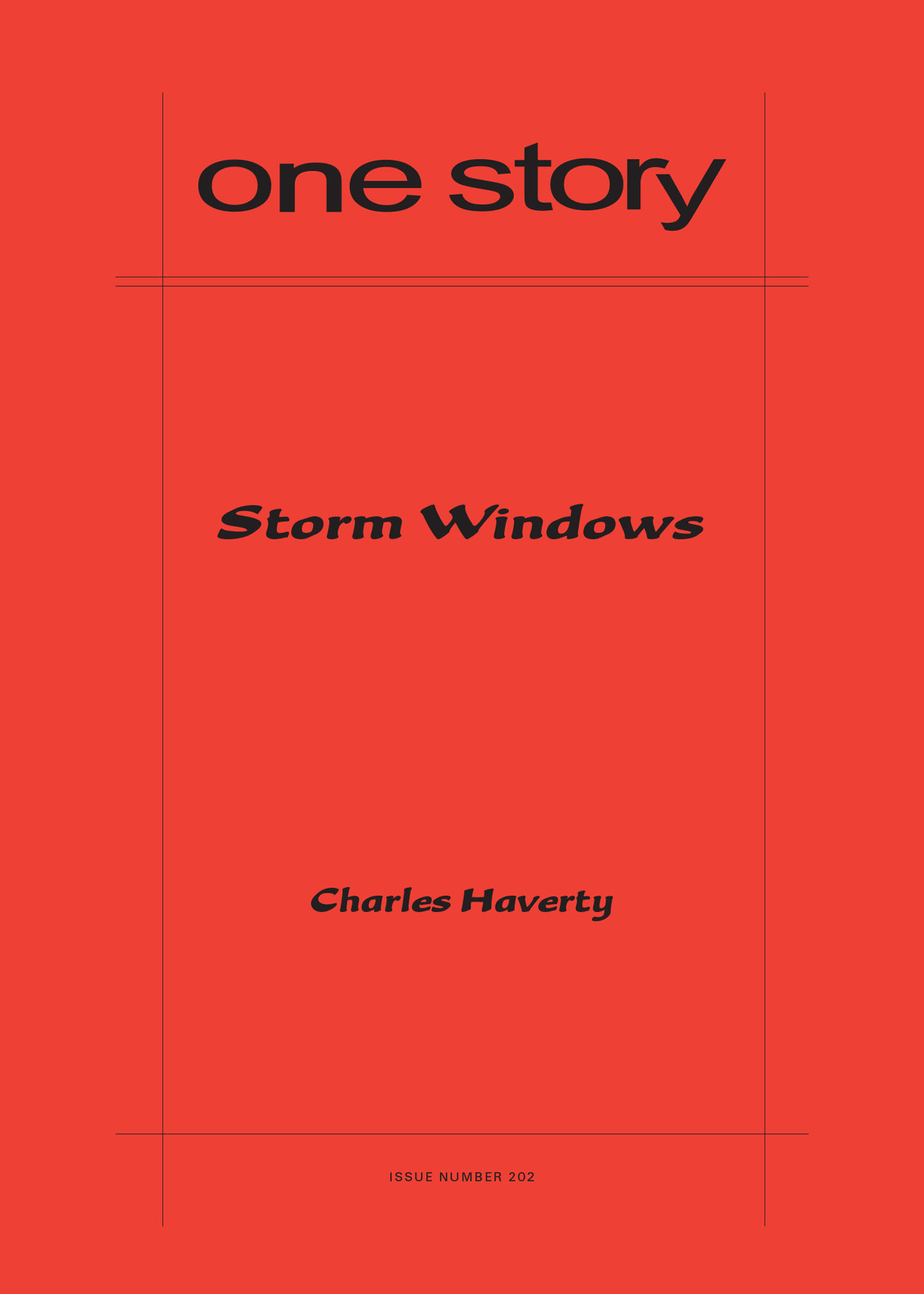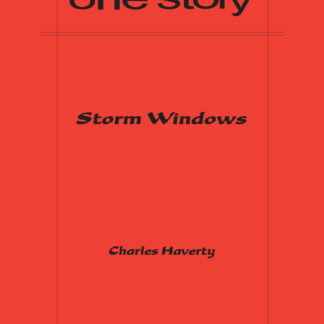
Storm Windows
$2.50
59 in stock
Excerpt
By seven-thirty my father hadn’t come home, so we sat down to dinner without him. My mother didn’t touch hers. She kept very still, her hands folded in her lap, her cranberry-colored dress crowded with the Twelve Days of Christmas—lords-a-leaping, maids-a-milking, geese-a-laying, the works. The saddest thing of all was that my father would miss her in that dress. Now and again, with a swish of silk, she’d step away from the breakfast room table to stare down the telephone on the kitchen wall, returning silent and stricken, her eyes fixed on the back of his chair. When my sister, Margot, and I had cleaned our plates, she told us to take the dog outside.
It was Christmas Eve and white beyond the dreams of Irving Berlin. I was eight years old, Margot was six, and I’d stop at nothing to make her laugh. Before dinner we’d made a snowman in the backyard, and now, to amuse her, I endowed him with breasts—massive breasts—so that he became a she, and when her breasts got so heavy they dropped to the ground, I reinforced them with wire croquet wickets and wooden stakes whose rounded tops protruded like nipples. As the breasts grew bigger and bigger, my sister laughed and laughed until Trixie ran around us, barking, churning up a muddy circle in the snow.
Charles Haverty
Charles Haverty was born in Flushing, Queens. His stories have appeared in AGNI, The Gettysburg Review, Ecotone, Colorado Review, New Ohio Review, and elsewhere. His collection, Excommunicados, is the winner of the 2015 John Simmons Short Fiction Award and will be published in the fall of 2015 by the University of Iowa Press. He lives in Lexington, Massachusetts.
Will Allison on “Storm Windows”
A few weeks ago, my 71-year-old dad called from South Carolina to tell me he wants to be cremated, not buried. He delivered the news matter-of-factly, but I held my breath as I waited for the bad news that surely came next.
“Is something going on?” I said. “With your health?”
“Me?” My dad laughed. “No, no. I’m good as ever. Still plugging along.” He explained that a high-school friend of his had just passed away, and it had gotten him thinking. Since I hold his power of attorney, he said, he just wanted to make sure I was clear on his wishes.
I hung up feeling relieved but with a lingering sense of having escaped a close call: one day, maybe someday soon, the news would not be so good.
Lionel Detweiler—the narrator of “Storm Windows,” by Charles Haverty—knows the feeling, and all too well. In our latest issue, he recounts three such near-misses involving his father, beginning with a half-hilarious, half-heart-stopping childhood Christmas when the elder Detweiler cannot breathe, or thinks he can’t breathe, or has a spell of some kind—it’s not exactly clear, but it’s funnier than a heart attack.
The story then vaults ahead to Lionel’s adult life, when his father survives two more brushes with death, real or imagined, including one in which Lionel nearly kills the old man himself. But don’t be fooled by the story’s comic bent: this is fiction primarily concerned with the big D, and even as Haverty’s lights-out prose had me laughing, it also had me staring down my parents’ mortality and my own.
As much as I love the first three parts of the story, though, it’s the fourth and final act that still leaves me with honest-to-goodness goose bumps each time I read it. I won’t spoil the ending for you, but if you’d like to find out how it figured into Haverty’s original conception of “Storm Windows,” and if you’d like to learn more about the story behind the story, please check out our Q&A with the author.
Q&A by Will Allison
- WA: Where did the idea for this story come from?
- CH: The idea grew out of a remnant from another Lionel story, one that never worked out, not yet. That story opened with a version of what became the front end of the second act of this one—the pumpkin-carving, the phone call, the flight to Chicago, the hospital burlesque—but it wouldn’t take. Once Lionel left the hospital, that earlier story took too sharp a turn away from the father, so I cut that bit of business and saved it for the right occasion. In time, I found a way to fit it into a pattern of near-misses, real and imagined, and called it “Father’s Death in Three Acts and an Epilogue.” That title didn’t survive the first draft, but it suggested a structure that did.
- WA: What was the most challenging aspect of writing this story?
- CH: The biggest challenge was making four episodes spread over a lifetime speak to each other, cohere, strike sparks, without the story feeling forced or overdetermined.
- WA: You mentioned that you’ve written other stories about the protagonist, Lionel. How does this one fit into the cycle?
- CH: This presented its own set of challenges. Each of those stories inhabits a specific moment in Lionel’s life, from age eleven into his early fifties, whereas this one, by its structure, bookends, touches on, and settles in among them. But I didn’t want the life of this story to depend on a knowledge of the others, and that took some doing.
- WA: Many of the story’s themes are developed through recurring images—of confessionals, of dust, of masks, and (of course) of storm windows. At what point in writing the story did you become conscious of these echoes?
- CH: Patterning is one of the pleasures of writing fiction, and a story structured like “Storm Windows” more or less requires these sorts of echoes and rhymes. Though I was conscious of some of these from the start (and lost others along the way), they were refined in the editing, and if the story succeeds on this level, it’s thanks to Will Allison and Hannah Tinti, the most clear-eyed, intuitive, and generous of editors.
- WA: Are any aspects of the story autobiographical?
- CH: Sure, but only in the most opportunistic and improvisatory way. That is, the story is creative writing, not crypto-autobiography. For instance, the line, “This can’t be the music I die to,” came to me in a moment of hypochondria, with Shirley Bassey singing “Goldfinger” in the background. At first, I thought the line belonged to Lionel but soon realized that it had to be spoken by the father. The story needed him to say it. In fact—and I’m almost embarrassed to admit this—the entire first act was constructed so that the father could deliver that line. So is that autobiographical? I’m afraid I sound disingenuous, self-important, and defensive here, but the sad fact is, my life doesn’t make good copy. Like Lionel, I moved from Long Island to Illinois when I was a kid, grew up in a big old brick house, attended Catholic schools, practiced law, and so on. And though Lionel and I inevitably share some of the same concerns or whatnot, I create an alternative universe in which to dramatize them. That’s the job. Otherwise, I’d bore the pants off the reader (and myself). So, to answer your simple question: while the story’s scenery and props are largely lifted from life, its characters and their actions and interactions aren’t, not really.
- WA: I love the ending of “Storm Windows”—it still gives me goose bumps. Did you know the ending when you began the story, or did it come to you later?
- CH: Thank you. I knew from the start that the story would end with those two words, but I didn’t know how I would get there or, for that matter, who would speak them. That’s another pleasure of writing fiction.
- WA: How long did it take you to complete this story?
- CH: It took six weeks to write a clean first draft, which is pretty quick for me. I put that aside to work on other things, and when I came back to it, I spent maybe a month revising. One Story took the story in September, and then the edits began.
- WA: What are you working on now?
- CH: I have a handful of short stories in the works, along with something longer.
- WA: What is the best bit of advice about writing you have ever received?
- CH: Two bits come to mind. The first is from Robert Frost’s “The Figure a Poem Makes”: “No tears in the writer, no tears in the reader. No surprise in the writer, no surprise in the reader.” The other is from Dennis Lehane: “When in doubt, just tell the fucking story.”
